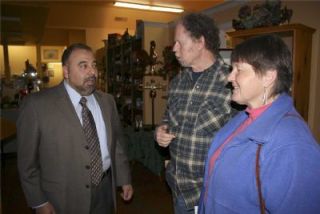ARLINGTON Residents of the Arlington and Smokey Point area had three chances to get some help in springing forward, when the staff of the Cascade Valley Sleep Disorders Center presented informational dinners March 4-6, in time for the daylight savings time shift March 9.
Dr. Muhammad Sayed made his first presentation at Little Italy in downtown Arlington March 4, offering a series of facts and figures on how common and dangerous sleep disorders can be.
There are 84 diagnosed sleep disorders to date, Sayed said. They affect 140 million Americans, and two-thirds of stroke victims also suffer from sleep apnea. This is not just about being relaxed. Sleep is a necessary biological function.
Sayed cited the reported role of chronic sleep deprivation in both the Exxon Valdez and Challenger space shuttle disasters, before noting the thousands of truck accidents and traffic fatalities that are linked to drivers falling asleep at the wheel.
Sleep medicine is a newly born branch of medicine, so our diagnoses are still modest, Sayed said. Its possible that one out of every two Americans suffers from sleep disorders, and while only 50 million Americans have been diagnosed with insomnia so far, there are estimates that it could be as high as 100 million. Sleep apnea could affect between 30 million-50 million Americans. Only 5 percent -10 percent of sleep disorders are diagnosed, because people just say, Oh, Im just tired.
Sayed attributed 200,000 vehicle accidents annually in America to sleep-related disorders, but pointed out other costs of not treating sleep disorders.
Part of the reason I shifted over from neurology was because I liked seeing a quick effect from my treatments, Sayed said. If 67 percent of sleep apnea patients go on to have strokes or congestive heart failures, then lets treat that now, before it becomes a stroke or a heart failure.
Sayed stressed the importance of treating the cause of insomnia, rather than merely its symptoms, noting that depression and anxiety can be both causes and symptoms of insomnia.
Insomnia can cause blood clots, type two diabetes, alcoholism and seizures, Sayed said. Sleep is a biological mandate, because many processes can only occur while you are asleep, such as memory consolidation. Without sleep, your short-term memory can go away. Without the growth hormones that are released only during certain stages of sleep, your balance of sugars and fats can be thrown off, leading to diabetes.
When asked why depression would lead to insomnia, Sayed explained that clinically depressed people lack the chemical serotonin, which allows them to continue their sleep cycles uninterrupted, without waking up in the middle of the night and not being able to fall asleep again.
The difference between clinical and situational depression is, if youre situationally depressed, theres some circumstance thats causing it, Sayed said. If youre clinically depressed, you can have everything and still feel miserable.
When asked how sleep apnea is treated, Sayed explained that the most common method is a mask which restores breathing to normal levels, but added that a new field of dental sleep medicine has designed devices which open the airway from inside the mouth.
Sayed concluded his presentation by inviting his audience to visit the sleep disorders centers four branches, in Arlington, Smokey Point, Stanwood and Granite Falls.
For more information, call the Cascade Valley Sleep Disorders Center at 360-435-7374.
Sleep Disorders Center helps Arlington, Smokey Point residents spring forward
ARLINGTON Residents of the Arlington and Smokey Point area had three chances to get some help in springing forward, when the staff of the Cascade Valley Sleep Disorders Center presented informational dinners March 4-6, in time for the daylight savings time shift March 9.








